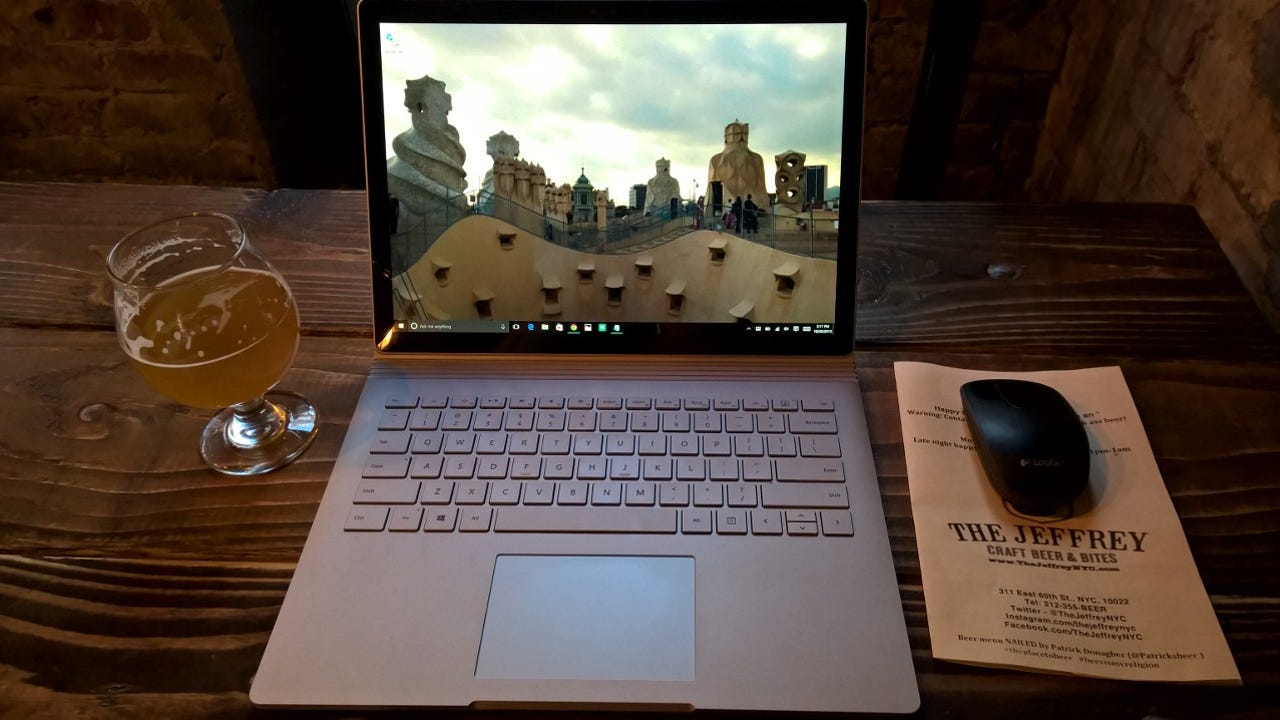Microsoft Surface Book review: A nice laptop, but still not my 'ultimate' PC


(Sadly, I didn't attempt to trademark that.)
So is Microsoft's "ultimate" laptop, the brand-new Surface Book which goes on sale on October 26, my Windows dream machine?
In some ways, yes. In some ways, no.
I have had a chance to use the Surface Book for the past two weeks. I received a pre-production loaner device from Microsoft on October 7. The model I received isn't one that's actually available for purchase: It's got a "Skylake" 6th-generation Intel Core i5 processor, 8 GB of RAM and 256 GB of storage, so it's pretty close to the $1,700 version of the Surface Book that Microsoft is selling. (I did not test-drive any of the Surface Book models with the NVIDIA GPU, nor did I have a Surface Pro 4 loaner to compare/contrast.)
Since then, I've been putting this thing through its paces, using it at home, carrying it around town and even using it surreptitiously in a few of my local haunts (as the photos in this post, all taken with my Lumia Icon phone, indicate).
On the plus side, the Surface Book is a really beautiful device. I really like the keyboard. The keys are well-spaced and it's comfortable and fast for those of us who live to type and type to live. The 13.5-inch screen, with 3000 X 2000 resolution, makes everything pop. (The full list of tech specs for the Surface Book are here.) The track pad is actually usable, especially if you are using Microsoft's Edge browser in Windows 10, where scrolling is incredibly fluid.
There's no doubt this is a luxury, high-end laptop. The Surface Book is more machine than I really need for my job, but when it comes to PCs, I'm willing to pay to get the best I can afford, since so much of my day is spent using these devices.
But...
This laptop is still not really lappable. (Sorry, Panos.) Because it has batteries in both the top and the base, it's tippy, especially when open on my lap. There isn't enough stickiness/bumpiness on the bottom of this laptop to hold it in place. I can't type on my lap using the Surface Book, though I can read and watch videos with it there, as I can hold onto it.
There's no kickstand on the clipboard, which has a purported four-hour battery life of its own when disconnected from the base. If you draw/doodle/hand write a lot by hand with the Surface Pen, maybe the clipboard would be for you. (I found the magnetically attached pen, which kept coming detached from my device, more hassle than useful tool.) If there's a keyboard at the ready, I see no good reason to disconnect it, especially if you can flip the screen to face away from it in "movie-watching" mode, or fold it back to draw.
I wouldn't call the Surface Book a typical Microsoft version 1.0 product, as it feels more finished than that. But it has some odd quirks.
A couple of times, I plugged in my headphones into the oddly placed (upper right corner of the screen) headphone jack and heard whirrings and grindings of what I'm assuming were the inner workings of the device. Other times when I did this, I didn't hear those sounds. In the cases where I do touch my screen, it bounces quite a bit more than it does on my Acer S7 ultrabook. The screen brightness control on the Surface Book also seems a bit off.
A brief history of Microsoft's Surface: Missteps and successes
Over the past couple of weeks, I've come to realize my expectations of what a "laptop" is have changed over time. This Surface Book feels surprisingly heavy at just under 3.3 pounds, compared to my 2.9 pound Acer Aspire S7 ultrabook. I think it's the placement of the batteries toward the back/hinge that make the Surface Book feel weightier.
I understand there are trade-offs between weight and power. Given Microsoft's target with Surface Book is Apple's MacBook Pro, Microsoft made these laptops (especially the models with the NVIDIA GPU) for "creators" who typically run power-intensive apps and services like Photoshop, CAD design programs and Visual Studio.But even a Notepad-centric user like me who wants a quality, high-performing, eye-catching device is still a potential Surface Book buyer. (I paid $1,500 for my Acer ultrabook in early 2014, so $1,500 for the entry-level Surface Book isn't a deal breaker.)
That said, I'm increasingly wondering if the next PC I want is actually something that's more Surface Pro-like, but with a real and permanently attached keyboard/base like the one on the Surface Book. I appreciate the weight and portability of the Surface Pro tablet, but I like the sturdiness and great typing experience on the Surface Book laptop.
If I have to buy a hybrid, I'd like to see the best of the Surface Book and Surface Pro worlds combined. If I don't, I'd rather see Microsoft make a laptop that's just an excellent laptop.